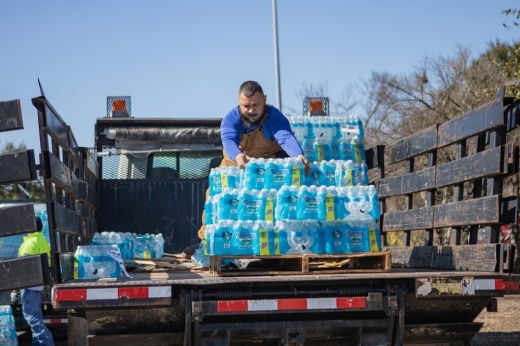The funding was used on an emergency basis in the midst of the citywide water quality incident and represents one piece of the costs incurred by the overnight breakdown at one of Austin Water's treatment plants. The city at that time spent $247,824 to buy canned and bottled water from King Daddy Distribution LLC to give to Austinites who were told not to drink their water over three days in early February.
Overall, the city utility spent a total of $752,750 on its response to the boil notice. Emlea Chanslor, senior public information specialist at Austin Water, said that figure included more than $402,000 related to bottled water costs and nearly $293,300 for the utility's emergency response and staffing. Tens of thousands more were spent on overtime pay, consulting, traffic control, water distribution and equipment rentals.
While Austin Water needed to buy a large amount of water on an emergency basis to distribute to residents, the utility said it had about 135,000 water bottles or cans on hand ahead of the incident that were used to kick-start distribution efforts. Chanslor said the utility still keeps thousands of bottles or cans on hand in addition, and the city's homeland security and emergency management office also said it keeps 55 pallets of water at its warehouse.
"Austin Water continues to maintain at least 135,000 bottles or cans of water in our inventory to respond to events like these. We also maintain master agreements with multiple vendors for additional supply," Chanslor said in an email.
Utility improvements, reviews
In addition to costs tied to the boil notice, the fallout from the February event has also included a leadership change at Austin Water, the allocation of new funding for staffing and equipment upgrades, and the launch of a wide-ranging audit of its operations.
While Austin Water completed its own investigation into the cause of the boil notice, City Council also called for the external audit to review the utility's recent history of several water quality events. The audit will be completed through The University of Texas Center for Water and the Environment with support from other contracted experts.
City Auditor Corrie Stokes said the audit will cost the city $816,000 and is expected to wrap up in December.
Since the February, utility representatives said they are making progress on a range of recommended improvements forwarded in the wake of the boil notice and last year's Winter Storm Uri. The city's draft spending plan for fiscal year 2022-23 would also give Austin Water a 4.21% funding bump to a $683.75 million budget, an increase including 47 new staff positions. Nearly $237 million in capital improvements is also proposed for the upcoming fiscal year.





